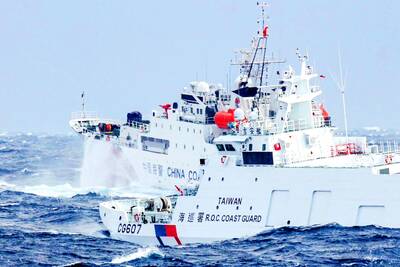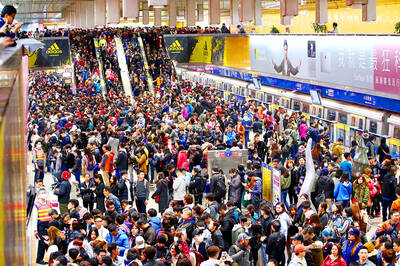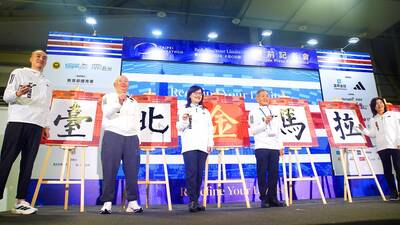A group of environmentally conscious academics has formed an association to promote more eco-friendly travel.
“Travel should not just mean eating sumptuously and staying in luxury accommodations,” said Tao Yi-huang (陶翼煌), an associate professor at Tungnan University and chief executive of the Taiwan Society of Xu Xiake.
Tao dislikes the way mountain resorts have been promoted, especially TV commercials that show a family driving their sport utility vehicle (SUV) into a lush mountain area and then barbecuing and playing on riverside rocks or grass.
“That is not the way to enjoy ecotourism, but rather a way to destroy the natural environment,” Tao said in a recent interview with a local paper.
His group’s aim is to promote eco-friendly travel styles, he said.
The group is named after Xu Xiake (徐霞客), a famous Ming Dynasty traveler and geographer.
Xu Xiake, who began to travel when he was 22 years old, explored almost half of China. His travel diary, Travel Notes of Xu Xiake, is the earliest such record in China. It details geographical information on the regions he visited and is the world’s earliest record of Karst landscapes and writings on how they were formed.
Xu was an environmentalist, Tao said, because he criticized the rulers of his time for their slash-and-burn agricultural policies that decimated the mountains and forests. He also wrote of how mining, animal husbandry and travel damaged the land.
On his long journeys, Xu endured many hardships and often slept in the open.
“Society needs to learn from Xu’s spirit of overcoming hardships and turning them into low-carbon, eco-friendly travel and lifestyles,” Tao said. “When our group travels, our first choice is to walk or take public transport.”
“We usually choose to eat locally grown farm produce,” he said, adding that restaurants shouldn’t try to offer delicacies from around the world.
The group never stays at hotels or bed-and-breakfasts (B&Bs) that are built on slopes, he said.
“Such accommodations may offer beautiful mountain views, but their construction is damaging to water and soil conservation,” Tao said. “We like to stay at places that were built with locally available materials, which would have saved transportation resources.”
Tao said students once asked his advice about a trip they were planning to Cingjing Farm in Nantou County.
“I told them to choose an affordable B&B that is located in a legally permitted area away from the main roads, is properly equipped to treat garbage and one that adheres to water and soil conservation practices,” Tao said.
His students managed to find accommodation that met these standards, but only after an extensive online search, he said.
“Travel planning should be part of students’ education. Travel should not be just for fun — people should be able to learn something in the process of arranging transportation and accommodations,” Tao said.
Low-carbon travel is becoming increasingly popular in Taiwan, China and Hong Kong, and consequently, interest in Xu Xiake is also widening, Tao said.
“Like-minded people in China and Hong Kong have also formed associations to study and promote Xu’s legacy,” Tao said.
Tao said his association has regular contact with other Xu Xiake groups in China and Hong Kong and usually organizes two to three local or overseas trips per year.
“Besides enjoying the natural scenery, we also evaluate whether the tourist facilities and promotional approaches in other countries adhere to the spirit of low-carbon use and energy conservation,” he said.
Most of Taiwan’s tourist spots are not sufficiently “low carbon” in their operations, he said.
One of the exceptions is the Maoao Community in Gongliao Township (貢寮), Taipei County, he said.
“Maoao’s appeal lies in its low-profile development. It used to be a thriving fishing town, but it lost its steam with the migration of its young residents. It is re-emerging by developing ecotourism,” Tao said.
Instead of building new tourist facilities, residents have converted old houses into cafes and B&Bs. Eco-friendly farming is widely practiced and locally produced seaweed is made into jellies and health foods, he said.

READY: The CGA said it closely monitored China’s maritime exercise, deployed vessels to shadow the Chinese ships one-on-one and set up emergency response centers Chinese navy and coast guard ships have returned to China, signaling the end of a massive maritime exercise, authorities said yesterday. The Coast Guard Administration (CGA) released images it said showed Chinese vessels sailing north in rough seas past Taiwan on Thursday, on their way to China. “All the Chinese coast guard went back to China yesterday, so although they have not officially made any announcement, we consider it over,” CGA Deputy Director-General Hsieh Ching-chin (謝慶欽) said. Beijing has not confirmed the drills and the Chinese Ministry of National Defense did not say whether the maneuvers had taken place when asked at a

People can take the Taipei MRT free of charge if they access it at Nanjing Sanmin Station or Taipei Arena Station on the Green Line between 12am and 6am on Jan. 1, the Taipei Department of Transportation said on Friday, outlining its plans to ease crowding during New Year’s events in the capital. More than 200,000 people are expected to attend New Year’s Eve events in Taipei, with singer A-mei (張惠妹) performing at the Taipei Dome and the city government’s New Year’s Eve party at Taipei City Hall Plaza, the department said. As people have tended to use the MRT’s Blue or

PUBLIC TRANSPORT: As some roads would be fully or partially closed, people are advised to take the MRT, with services expanded to accommodate more riders This year’s Taipei Marathon, which has obtained its first gold label certification from World Athletics, is to be held from 5am to 1pm tomorrow and would have 28,000 participants. The race is to start from the Taipei City Plaza and would go through major roads throughout the city, with traffic control implemented from 6am to 2pm, officials said. The Taipei Mass Rapid Transit (MRT) system and New Taipei City MRT Circle line would start operating at 5am on the day of the race, they said. The race would cover Renai Road, Xinyi Road, Hangzhou S Road, Aiguo east and west roads,

Taipei is participating in Osaka’s Festival of Lights this year, with a 3m-tall bubble tea light installation symbolizing Taiwan’s bubble tea culture. The installation is designed as a bubble tea cup and features illustrations of Taipei’s iconic landmarks, such as Taipei 101, the Red House and North Gate, as well as soup dumplings and the matchmaking deity the Old Man Under the Moon (月下老人), affectionately known as Yue Lao (月老). Taipei and Osaka have collaborated closely on tourism and culture since Taipei first participated in the festival in 2018, the Taipei City Department of Information and Tourism said. In February, Osaka represented